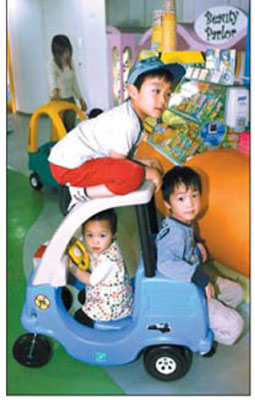Through playing, children learn to develop skills and talents, share and cooperate with others, resolve conflict and practice decision-making, according to Rowhani.
"In today's society, the time for play is greatly reduced for some children due to busy family lifestyles, more households in which both parents work, as well as a general preoccupation with academic activities at the expense of playtime," says Rowhani.
"Play centers like Kidtown provide a resource for children and families to develop capacities through structured play."
Playtime is, of course, part of the bigger picture for Chiang and her partners. The group of young Asian-expatriate mothers ultimately hopes that the play center will help change the attitude of the majority of Chinese parents to playtime.
"Chinese parents see play as a waste of time," says Chinese-American Chiang, who moved to Shanghai about three years ago. "We hope to convince them that play is good for their kids."
"We want them to understand that kids learn the most from play," says Kidtown partner Emy Machida. "It's a very new concept in Asia."
And, as the play center celebrates its first anniversary, the Kidtown concept gains ever-greater momentum in metropolitan Shanghai.
So much so, even the country's largest listed property developer China Vanke is tapping into the Kidtown market.
Kidtown is currently setting up two new on-site locations in Shanghai's residential Rancho Sante Fe and Stratford villas. And the play center will establish three more on-site locations in the metropolis - at the Blue Mountain, Tiziano and Lakefront villas. Kidtown will also provide these locations with playgrounds and educational services.
Japanese-expatriate mother Nami Yamaoka has been bringing her 3-year-old son to Kidtown for the past nine months. "He needed a place to play and socialize with other kids," says Yamaoka. "After school, he comes here, and intermingles with other kids."
Although there is an 11:8 expatriate/local ratio of kids at Kidtown, the local market is steadily growing. Local families now make up the largest group of one-year season ticket holders at Kidtown, Chiang says.

Although expat children make up the majority of Kidtown attendees, the local market is growing.